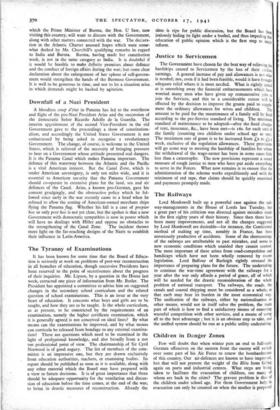The Railways
Lord Monkswell built up a powerful case against the rail- way-managements in the House of Lords last Tuesday, but a great part of his criticism was directed against mistakes made in the first eighty years of their history. Since then there have been many improvements, and not all the changes suggested by Lord Monkswell are desirable—for instance, the Continental method of making up time, notably in France, has been notoriously productive of accidents. Some of the shortcomings of the railways are attributable to past mistakes; and some to new economic conditions which unaided they cannot control. The most important of these arises from-road-competition and handicaps which have not been- wholly removed by recent legislation. Lord Balfour of Burleigh rightly stressed the importance of preparing plans for the future. The undertaking to continue the war-time agreement with the railways for a year after the war only affords- a period of grace, all of which will be needed for the drastic reconsideration of the whole problem of national transport. The railways, the roads, the canals and coastal shipping must be considered as a whole, so that each may bear its burden in the' most economical way. The unification of the railways, either by nationalisation or other means, would not in itself solve the problem, the main part of which is how to find a satisfactory means of removing wasteful competition with other services, and a means of using all to the best advantage ; but it is an obvious step to take, and the unified syblcui should be run as a public utility undertaking.


























 Previous page
Previous page